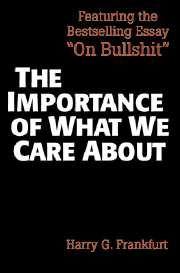Book contents
- Frontmatter
- Contents
- Preface
- Sources
- 1 Alternate possibilities and moral responsibility
- 2 Freedom of the will and the concept of a person
- 3 Coercion and moral responsibility
- 4 Three concepts of free action
- 5 Identification and externality
- 6 The problem of action
- 7 The importance of what we care about
- 8 What we are morally responsible for
- 9 Necessity and desire
- 10 On bullshit
- 11 Equality as a moral ideal
- 12 Identification and wholeheartedness
- 13 Rationality and the unthinkable
1 - Alternate possibilities and moral responsibility
Published online by Cambridge University Press: 05 June 2012
- Frontmatter
- Contents
- Preface
- Sources
- 1 Alternate possibilities and moral responsibility
- 2 Freedom of the will and the concept of a person
- 3 Coercion and moral responsibility
- 4 Three concepts of free action
- 5 Identification and externality
- 6 The problem of action
- 7 The importance of what we care about
- 8 What we are morally responsible for
- 9 Necessity and desire
- 10 On bullshit
- 11 Equality as a moral ideal
- 12 Identification and wholeheartedness
- 13 Rationality and the unthinkable
Summary
A dominant role in nearly all recent inquiries into the free-will problem has been played by a principle which I shall call “the principle of alternate possibilities.” This principle states that a person is morally responsible for what he has done only if he could have done otherwise. Its exact meaning is a subject of controversy, particularly concerning whether someone who accepts it is thereby committed to believing that moral responsibility and determinism are incompatible. Practically no one, however, seems inclined to deny or even to question that the principle of alternate possibilities (construed in some way or other) is true. It has generally seemed so overwhelmingly plausible that some philosophers have even characterized it as an a priori truth. People whose accounts of free will or of moral responsibility are radically at odds evidently find in it a firm and convenient common ground upon which they can profitably take their opposing stands.
But the principle of alternate possibilities is false. A person may well be morally responsible for what he has done even though he could not have done otherwise. The principle's plausibility is an illusion, which can be made to vanish by bringing the relevant moral phenomena into sharper focus.
In seeking illustrations of the principle of alternate possibilities, it is most natural to think of situations in which the same circumstances both bring it about that a person does something and make it impossible for him to avoid doing it.
- Type
- Chapter
- Information
- The Importance of What We Care AboutPhilosophical Essays, pp. 1 - 10Publisher: Cambridge University PressPrint publication year: 1988
- 14
- Cited by

